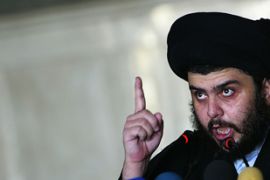Sadr clarifies ‘open war’ statement
Shia leader says recent threat was against US forces, not the Iraqi government.

“I wish you would continue your patience and your belief.
“When we threatened ‘open war’ we meant a war against the occupier, not a war against our Iraqi brothers,” it added.
Deaths
| Your Views |
Hundreds of people have died in Sadr City, a poor suburb of the Iraqi capital, and other Shia areas including Basra in the south since al-Maliki began the crackdown.
Al-Sadr threatened an “open war” on Saturday unless al-Maliki called off the campaign against his fighters in Baghdad, the oil hub of Basra and other Shia areas.
Although Basra has since become quieter, fighting has continued in and around Sadr City.
A general uprising by the group could unravel months of security gains in Iraq while US soldiers are drawing down.
Al-Sadr first imposed a ceasefire on the al-Mahdi Army last August. It has been widely credited with helping cut violence in Iraq but has come under severe strain during the clashes of the past month.
Al-Sadr made clear on Friday that he wanted US troops to leave Iraq.
“My brothers in the al-Mahdi Army and the Iraqi forces, be a single hand and stop shedding each other’s blood. Support all types of resistance in order to have a safe Iraq,” al-Sadr said.
Timetable refusal
The Shia leader supported the prime minister’s rise to power in 2006, but has since split with him over al-Maliki’s refusal to set a timetable for the withdrawal of US troops from Iraq.
Al-Maliki has threatened to bar al-Sadr’s movement from provincial elections on October 1 if he does not disband the al-Mahdi Army.
Al-Sadr’s supporters, who boycotted the last local elections in 2005, is expected to perform well at the expense of parties that backed al-Maliki, especially in the Shia south.
Many of his followers see the crackdown as an effort to sideline them before the polls and protect groups that support al-Maliki.
The government says the campaign is intended to restore the rule.